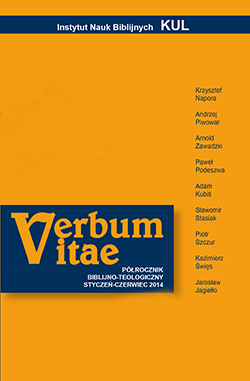Miłość Boża rozlana w sercach naszych (Rz 5,5)
The Love of God Has Been Poured Out within Our Hearts (Rom 5:5)
Author(s): Sławomir StasiakSubject(s): Christian Theology and Religion
Published by: Katolicki Uniwersytet Lubelski Jana Pawła II - Wydział Teologii
Keywords: Letter to the Romans; love; Christian love; hope; St. Paul
Summary/Abstract: The author shows that Paul wrote about love in the three main thematic areas of the letter to the Romans. First, he raised the issue of “the love of God” (hē agapē tou Theou) referred to the second and third person of the Holy Trinity. At the beginning, he dealt with the love that has been poured into our hearts by the Holy Spirit, which stays in a close relationship with the Christian hope (5:5). Then he pointed out the love that we have been granted by the redemptive death of Jesus Christ, not only because He died for us, but because He did so while we were still sinners (5:8). We cannot be detached from this love (8:39), which Paul proved by shoving a wide range of dangers that can separate the Christian from God. Writing about the love of God (8:39), the Apostle showed it in a close relation to “the love of Christ” (hē agapē tou Christou). Both realities intermingle and overlap because “the love of Christ”, from which no one can separate us (8:35), is “the love of God that is in Christ Jesus”(8:39). At the end of his letter, Paul encourages the addressees through “the love of the Spirit” (hē agapē tou Pneumatos) to support him in the hardships that await the apostle in Jerusalem (15:30). Man’s response to the love of God the Father, the Son and the Holy Spirit, is also love. Only in a few places Paul points out what Christian love should be characterized by. First of all, it should be free of any negative feelings, especially hypocrisy (12:9). If love does harm anybody, it means that it is the perfect fulfilling of the Law (13:10). The negligence of love in daily behavior, on the other hand, for example with regard to the clean or unclean food (14:15), results in exposing “the weak” to destruction.
Journal: Verbum Vitae
- Issue Year: 2013
- Issue No: 23
- Page Range: 161-180
- Page Count: 20

